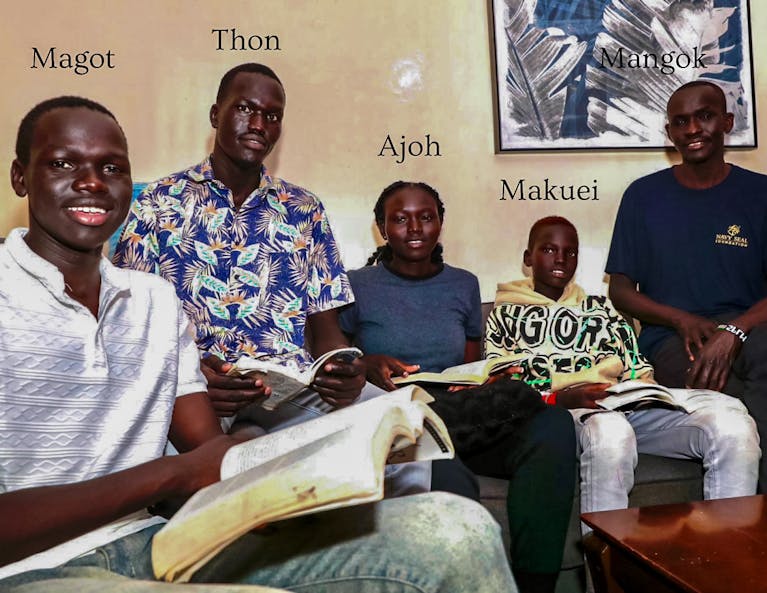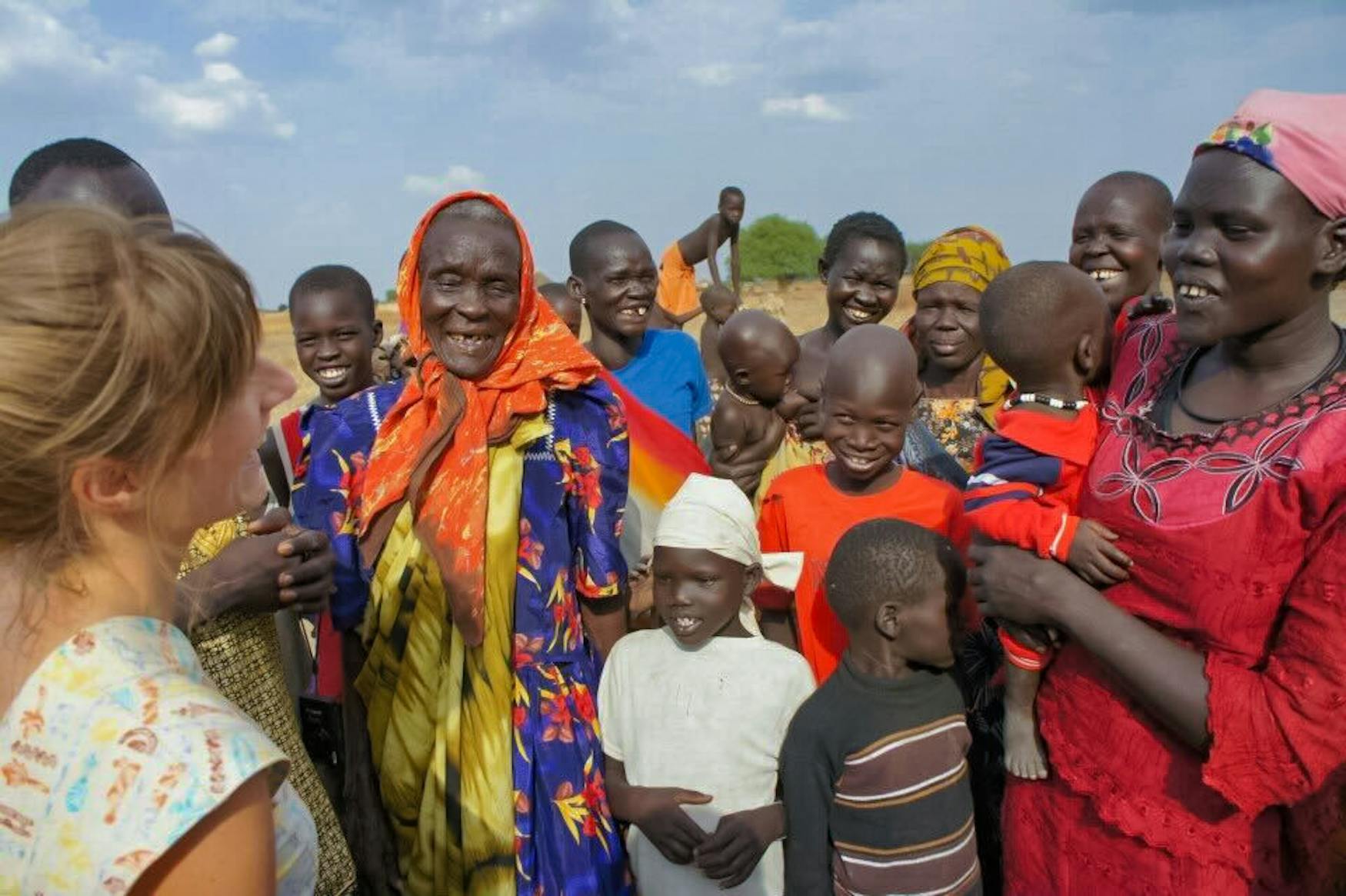Team Mangok: Mangok Bol and other staff work to resettle Bol’s niece and nephews in the U.S.
After rescuing his kidnapped and orphaned nieces and nephews, Mangok Bol is working with Brandeis staff members to bring four of his late brother’s children from South Sudan to the U.S.
Program Administrator for Latin American, Caribbean and Latinx Studies and Department Coordinator for Chemistry Mangok Bol came to the United States in 2001 as a refugee of the Second Sudanese Civil War after having spent 13 years in refugee camps in Ethiopia and Kenya from the ages of nine to 22. He came to the U.S. as a part of the Lost Boys and Girls program, which resettled children who were orphaned or separated from their parents in the war. Bol’s story was covered in The Boston Globe, National Public Radio, The Justice and BrandeisNOW.
In 2014, Bol’s brother and sister-in-law were murdered in their village. Four of their seven children were kidnapped by the attackers. With the support of former United Nations ambassador Samantha Power, Bol was able to rescue Anyieth, Makuei and Ajoh and reunite them with their three siblings: Thon, Magot and Mach. The oldest niece, Abiei, remains missing.
Mangok is hoping to welcome four of the siblings — Thon (now 21), Magot (now 17), Ajoh (now 15) and Makuei (now 11) — to the U.S. in the coming months.

After graduating from college, Bol joined Brandeis in 2008 as an Academic Administrator for International & Global Studies and Cultural Production. In 2012, he earned his Master of Arts in Finance from the Brandeis International Business School. He has become a beloved member of the Brandeis community and found the support of a group of academic administrators who are working to help Bol bring his niece and nephews to the U.S. The team consists of Lisa Pannella (ENG), Alexandra Brandon (WGS), David Devore (CEMS), Julie Seeger (PHIL) and Jennifer Stern (FA).
Preparing to bring the siblings to the U.S. has proven to be a complicated process, prolonged by various bureaucratic steps and new immigration policies following changes in office. The four had to qualify as refugees, go through a thorough vetting procedure and are still waiting to resettle. They are expected to arrive sometime over the summer.
In an April 12 interview with Bol, Panella and Seeger, Bol explained that he hopes to bring his family to the U.S. because of the lack of safety and resources available to them and the trauma they have endured from losing both parents.
Bol went through a similar process with his niece and nephews when he left Africa, and he noted the abundance of opportunity that he found in the U.S. The difference, however, is that they will be coming to the states with the support of not only their uncle, but a whole community at Brandeis. He stressed his plans to provide them with opportunities like education, which he believes can be “life changing” for people of their circumstances. With the provisions they have made, Bol said, “I think they will do much better than I did.”
Presently, the four siblings have been approved to immigrate, have undergone cultural orientation and are now in the last steps of medical evaluation. The greatest concern regarding their arrival is securing housing in Massachusetts, which has proven to be a challenge with the state’s rising housing costs. Since around Thanksgiving of 2023, Team Mangok has been fundraising for the siblings’ living costs for the first few months of their transition. The group has raised about $26,000 — much of which has come from small donations by staff and other community members.
It stood out to Bol that he and his family have the support of the entire Brandeis community because of his work. Seeger recalled that the furniture of a late former professor was donated to their cause. “Her children believed that she would be proud to give her furniture to Mangok’s family,” Seeger shared. It now sits in a storage unit as housing arrangements are being made.
Pannella spoke about how Team Mangok is made up of individuals who each bring their respective strengths to the effort. Her experience with government training for a different resettlement program informed her of the steps required in the four siblings’ resettlement case. Like Bol, Pannella too commented on the massive bureaucratic process that comes with trying to bring a refugee into the states. She explained that the two older brothers have to sign up for the Selective Service, and all of the siblings have to be set up with Massachusetts healthcare, Social Security and work authorization.
Seegar added, “We’ve got to acknowledge that Mangok is beloved by just about anybody whose path he has crossed. Anybody who knows Mangok is happy to roll over for him. He’s adorable, I mean, everyone loves him. We all want to help.” She remembered when they were just beginning to start fundraising and the organizers felt uncomfortable asking for money, someone told them, “You’re giving people the opportunity that they want because — like [Seeger] said — everybody wants to help.”
In a similar vein, Pannella shared that she feels fortunate to have the opportunity to help Bol’s family. “I think it is a moment to bring out the best in humanity. Mangok has seen the worst of humanity, twice.” Pannella noted the bombardment of negativity that exists in stories such as these, and Team Mangok has given people the chance to put positive energy out in the world: “I feel excited to be able to have this moment to be compassionate.”
Bol added that when he came to Brandeis, he approached it like any other job and expected to stay on for only a limited amount of time. He was not expecting to still be at Brandeis 15 years later, and he credits the environment, the students and his colleagues as the reasons why he stayed.
A child of a Brandeis community member once gave Bol $18, and he accepted this as a symbolic gesture of support. “There is something attached to that, you know. You are changing someone’s life,” he said. “People want to be part of something bigger.”
Preparing funds for housing and living costs are only the start of this great undertaking. Bol spoke of the great amount of trauma that his once abducted niece and nephew will have to process. They lived with their captors for over a year and are still battling the emotional aftermath. Bol recalled a moment when a doctor who was unaware of his niece’s past asked her if she had traveled to an area where she was exposed to a certain disease: “That made her cry because she was reminded of her abduction.”
Bol expects that this trauma will take years to recover from, but he believes that a new environment will be especially helpful. “I think when she gets better counseling service, when she starts going to better schools, [has] a good network and [feels] safe and secure, she can achieve a lot here with her siblings,” he said. Bol stated that the U.S. has “some of the best opportunities for somebody who is looking for a better life. You can do a lot of yourself here when you have a space where you can feel secure.”
As a former Lost Boy, he’s been aware of the fact that some of the other young men who came to the U.S. through the program succumbed to alcoholism and substance abuse — a few even having gone to jail. In light of this knowledge, Bol says he will be especially involved in his niece and nephews’ upbringing, being especially conscious of protecting them during the transitional phase into their new life.
The siblings seem, to Bol, to have mixed feelings about the move to the U.S., because they will have to start a new life away from people they have known since they were young. He hopes that when his niece and nephews come to the U.S., students in the Brandeis community will welcome them, mentor them and “help them get to know how it is here,” as they will be transitioning into a vastly different culture.
In other hopes for their future, Bol looks forward to living together as a family. Having had to raise them from afar as the sole male figure in their lives was a challenge for him. “It will mean the world to stay as a family, somewhere in Newton, and getting up and getting to the dinner table; doing things together,” he shared fondly.
From living alone in Massachusetts to suddenly becoming a guardian of four, Bol is prepared for an enormous adjustment. “He left his village when he was nine, and so to have a stable space and to have family members around is different for Mangok,” Pannella commented.
“When they come here I’m going to throw myself out there and be a parent,” Bol said, looking forward to being able to see the children grow and become people of their own.




Please note All comments are eligible for publication in The Justice.